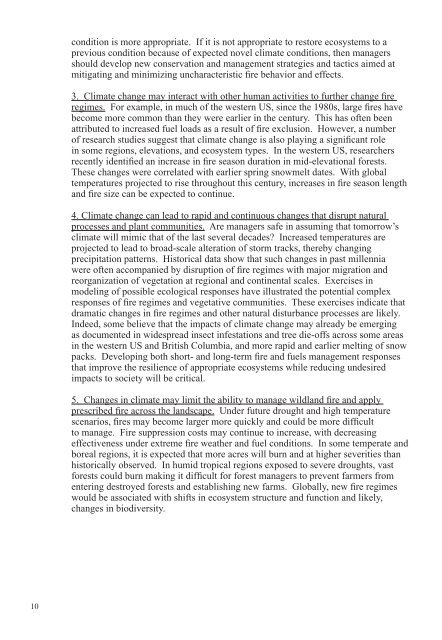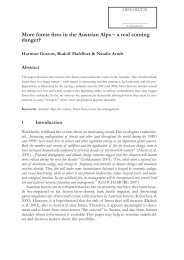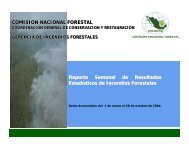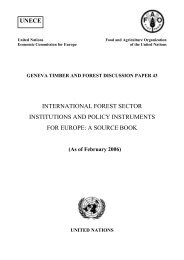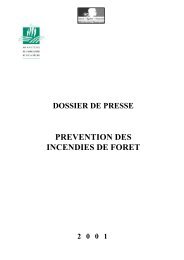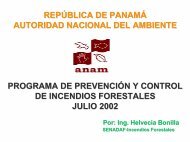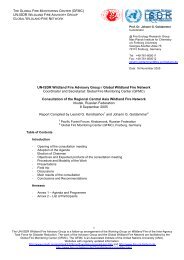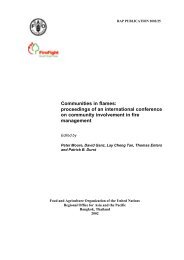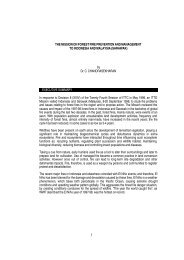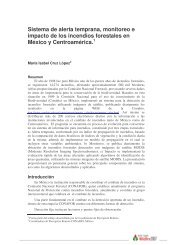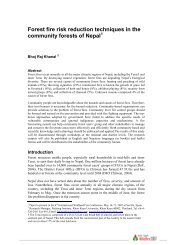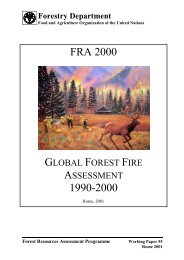Wildland Fire Management: Handbook for Trainers - The Global Fire ...
Wildland Fire Management: Handbook for Trainers - The Global Fire ...
Wildland Fire Management: Handbook for Trainers - The Global Fire ...
Create successful ePaper yourself
Turn your PDF publications into a flip-book with our unique Google optimized e-Paper software.
10<br />
condition is more appropriate. If it is not appropriate to restore ecosystems to a<br />
previous condition because of expected novel climate conditions, then managers<br />
should develop new conservation and management strategies and tactics aimed at<br />
mitigating and minimizing uncharacteristic fi re behavior and effects.<br />
3. Climate change may interact with other human activities to further change fi re<br />
regimes. For example, in much of the western US, since the 1980s, large fi res have<br />
become more common than they were earlier in the century. This has often been<br />
attributed to increased fuel loads as a result of fi re exclusion. However, a number<br />
of research studies suggest that climate change is also playing a signifi cant role<br />
in some regions, elevations, and ecosystem types. In the western US, researchers<br />
recently identifi ed an increase in fi re season duration in mid-elevational <strong>for</strong>ests.<br />
<strong>The</strong>se changes were correlated with earlier spring snowmelt dates. With global<br />
temperatures projected to rise throughout this century, increases in fi re season length<br />
and fi re size can be expected to continue.<br />
4. Climate change can lead to rapid and continuous changes that disrupt natural<br />
processes and plant communities. Are managers safe in assuming that tomorrow’s<br />
climate will mimic that of the last several decades? Increased temperatures are<br />
projected to lead to broad-scale alteration of storm tracks, thereby changing<br />
precipitation patterns. Historical data show that such changes in past millennia<br />
were often accompanied by disruption of fi re regimes with major migration and<br />
reorganization of vegetation at regional and continental scales. Exercises in<br />
modeling of possible ecological responses have illustrated the potential complex<br />
responses of fi re regimes and vegetative communities. <strong>The</strong>se exercises indicate that<br />
dramatic changes in fi re regimes and other natural disturbance processes are likely.<br />
Indeed, some believe that the impacts of climate change may already be emerging<br />
as documented in widespread insect infestations and tree die-offs across some areas<br />
in the western US and British Columbia, and more rapid and earlier melting of snow<br />
packs. Developing both short- and long-term fi re and fuels management responses<br />
that improve the resilience of appropriate ecosystems while reducing undesired<br />
impacts to society will be critical.<br />
5. Changes in climate may limit the ability to manage wildland fi re and apply<br />
prescribed fi re across the landscape. Under future drought and high temperature<br />
scenarios, fi res may become larger more quickly and could be more diffi cult<br />
to manage. <strong>Fire</strong> suppression costs may continue to increase, with decreasing<br />
effectiveness under extreme fi re weather and fuel conditions. In some temperate and<br />
boreal regions, it is expected that more acres will burn and at higher severities than<br />
historically observed. In humid tropical regions exposed to severe droughts, vast<br />
<strong>for</strong>ests could burn making it diffi cult <strong>for</strong> <strong>for</strong>est managers to prevent farmers from<br />
entering destroyed <strong>for</strong>ests and establishing new farms. <strong>Global</strong>ly, new fi re regimes<br />
would be associated with shifts in ecosystem structure and function and likely,<br />
changes in biodiversity.


